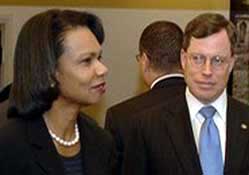Rice’s Advisor: CIA Breaching Int’l, War Crimes Law

The senior Bush administration official, the former head of the 9/11 Commission, and the former senior official in US Secretary of State Condoleezza Rice's era Philip Zelikow described CIA interrogation techniques used as torture and said he warned in a secret memo at the height of the "war on terror" that they breached the US's own war crimes laws.

Zelikow unveiled that what US officials euphemistically called "enhanced interrogation", such as sleep deprivation and water boarding, are only forms of physical torments.
Zelikow, who was counselor to Rice, expressed his concerns in a top secret 2006 memorandum.
The memo, to other members of the committee who represented the justice and defense departments and intelligence services, warned that the CIA's use of water boarding and other abuses were almost certainly in breach of US and international law. But the memo so alarmed the administration that it was immediately rejected and all copies were ordered destroyed.
A draft version of the memo, found at the state department, was released this week following a freedom of information request by the National Security Archive in Washington.
Zelikow said that a later supreme court ruling that the Geneva Conventions do apply to those deemed by the Bush administration to be "illegal combatants" reinforced his position that some of the CIA's interrogation methods were illegal. "If I was right, officials would be violating the federal War Crimes Act, a felony punishable by up to life imprisonment," he stressed.
In his 2006 memorandum to other members of the National Security Council committee of deputies to cabinet secretaries, the highest level interagency committee considering the legality of "enhanced interrogations", Zelikow said that such methods were in breach of the Convention Against Torture as well as a recent US law that "extended the prohibition against cruel, inhuman or degrading treatment to all conduct worldwide".
Zelikow argued that US law on the issue applied the American constitution's own standard regarding "cruel and unusual punishment" and that there is a long history of case law that prevents techniques used by the CIA from use in the US.
"The techniques least likely to be sustained are the techniques described as "coercive", especially viewed cumulatively, such as the water board, walling, dousing, stress positions and cramped confinement," Zelikow wrote in the memo.
Toward the end of the memo, part of a section has been blacked out by a censor. It refers to foreign governments abandoning several of the techniques Zelikow criticises. Asked if those governments include the UK, he said: "Yes."
Zelikow said that after the office of legal counsel decided his memorandum "was not appropriate for further discussion", the order came from the White House to destroy all copies.
The existence of the memo came to light when Zelikow gave testimony to the Senate judiciary committee two years ago in which he described the systematic physical abuses by the CIA as "unprecedented" and said that at least some of the legal opinions of justice department lawyers on the maltreatment of prisoners were "unsound, even unreasonable".
"The US government adopted an unprecedented program of coolly calculated dehumanizing abuse and physical torment to extract information. This was a mistake, perhaps a disastrous one," he said.
Zelikow described an atmosphere in which policymakers fell under the spell of the intelligence community and became deferential "in a time of seemingly endless alarms". But, he added, the CIA had no real experience of interrogating enemy captives and so "improvised an unprecedented elaborate, systematic program of medically monitored physical torment to break prisoners and make them talk".
Source: Guardian , Edited by moqawama.org




